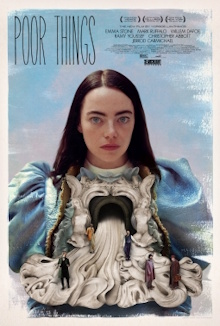It’s pretty impressive how director Yorgos Lanthimos has transitioned from making weird, almost incomprehensible art films to mainstream success. With recognition comes a bigger budget to play with and so Poor Things is set in a gorgeous, steampunk version of Victorian England. It’s in service of a story that resembles the familiar one of Frankenstein’s monster, except with a female lead and the creation is allowed to grow and mature to full adulthood. I found this film a tad long and I think the overemphasis on sex is to the detriment of the other ways the character can grow. Still, it’s a beautiful film and a clever twist on a familiar story.
In a manor in London, a doctor Godwin Baxter who is heavily-scarred by the experiments of his own mad scientist father, raises a woman as his daughter. Though she has the body of a fully-grown woman, Bella seemingly has the mind of a child with poor coordination and weak language skills. Godwin recruits one of his students, Max McCandles, to help document his ongoing experiment. Bella’s mind develops quickly and after Max develops feelings for her, he demands to know the truth. Godwin explains that the body was that of a pregnant woman who committed suicide by jumping from a bridge. He replaced the woman’s brain with that of the fetus inside her and named her Bella Baxter. He encourages a romance between Max and Bella, reasoning that it is part of her emotional development, so Max proposes marriage to her. At about the same time, she discovers the pleasure of masturbation and indulges in it almost constantly without shame. Godwin’s lawyer Duncan Wedderburn learns of her existence and invites her to run off with him to learn more of the experiences of life. He takes her to Lisbon where for a time they live a debauched life of sex and worldly pleasures.
It’s one thing to go the mad scientist route with Godwin having a heavily-scarred face that suggests he was taken apart and then sewn back together and needing to have his digestive fluids externally replenished. It’s another to have a full-on steampunk world with carriages decorated with the figurehead of a horse but are actually powered by a steam engine, a Lisbon that has airships soaring above its skyline, ocean-crossing liners with inverted bows and so on. It makes for a wonderfully sumptuous world that is just there as the backdrop for Bella’s adventures that wouldn’t have been possible without a generous budget. The visuals are so vibrant that I wondered if it had been inspired by video games as some shots are very reminiscent of BioShock for instance. This is an amazing production in every respect with Emma Stone’s performance being especially exceptional. It is just not possible at some point to see the actress. You look at the screen and all you see is Bella the character.
The film was adapted from the novel by Alasdair Gray which explicitly frames itself as being a retelling of Frankenstein. There it makes more sense why her journey of personal liberation revolves around sex so much as in the book Godwin made her to be his personal companion. Here, Godwin has a much healthier paternal relationship with Bella so the sex is supposedly just one part of her maturing to become an adult. That’s why I was frustrated by how much sex there is and so comparatively little of the other ways she grows as person such as her being exposed to death and suffering, or engaging in philosophical debate with others or learning about how money works. I found it amusing that in Paris, Bella befriends a fellow prostitute and joins the Socialist movement with her. Yet there’s no serious intellectual engagement with the ideas and certainly afterwards neither Bella nor her friend seem to have any qualms about enjoying life in the manor of the very rich Godwin Baxter. I get it of course, it’s easier and more shocking to portray freedom and personal agency in the form of sex and choosing who she wishes to associate with. But it’s still a cinematic simplification that results in a shallower film.
Still, as Emma Stone herself states, this is a kind of fairy tale about a woman who gets to learn everything about life and herself from nothing. and it’s a success in that regard. Mary Shelley’s original story has the scientist’s creation turn into a monster because he was deprived of education and care. Here, Bella is given the space and opportunity to learn and flourish and so turned out wonderfully. It’s a progressive take that undoubtedly improves on the original yet to rationalists like me, it doesn’t go far enough. Why did they never consider the use of their brain transplant technique to extend Baxter’s life?
